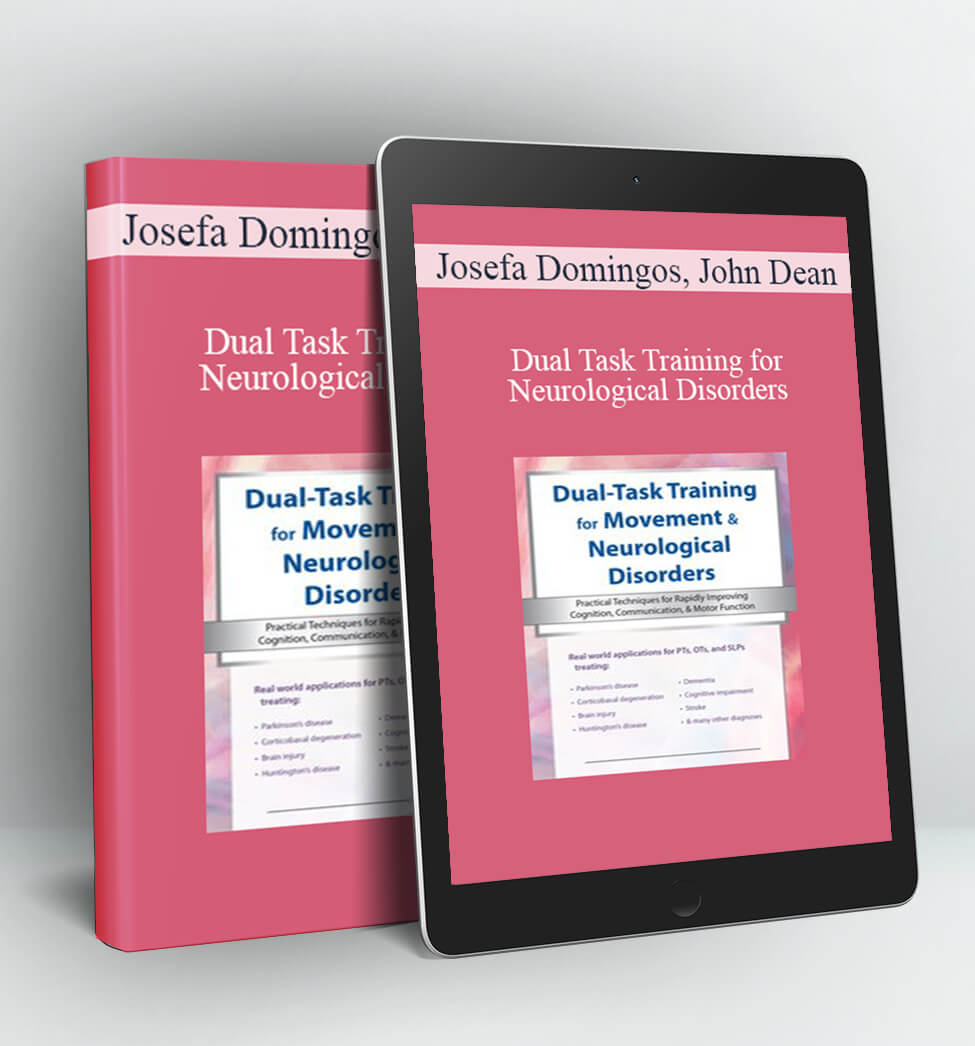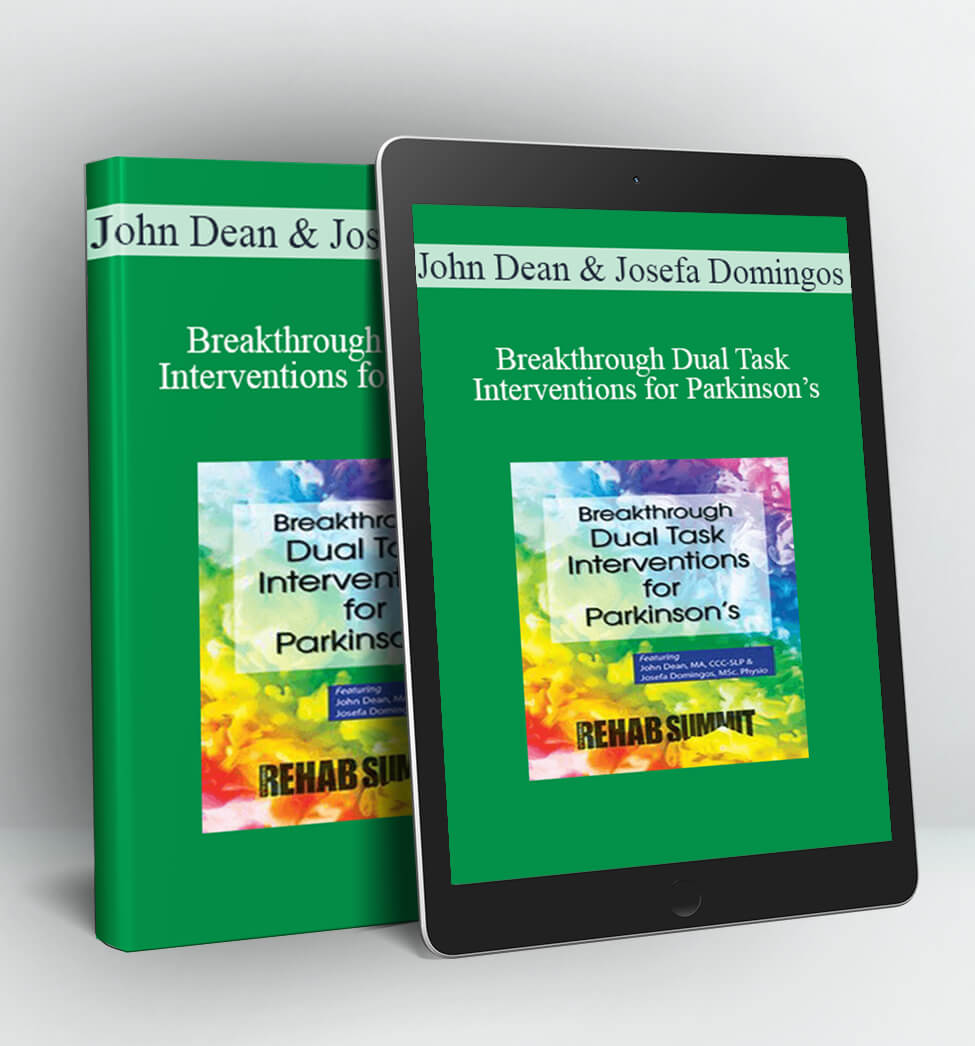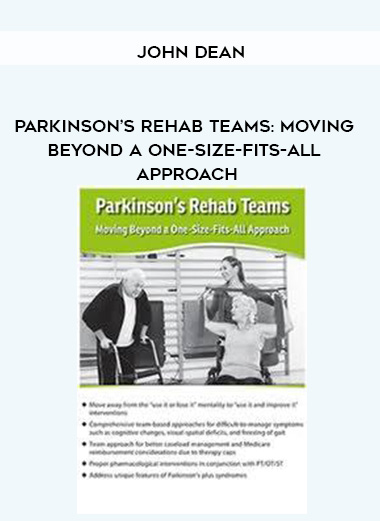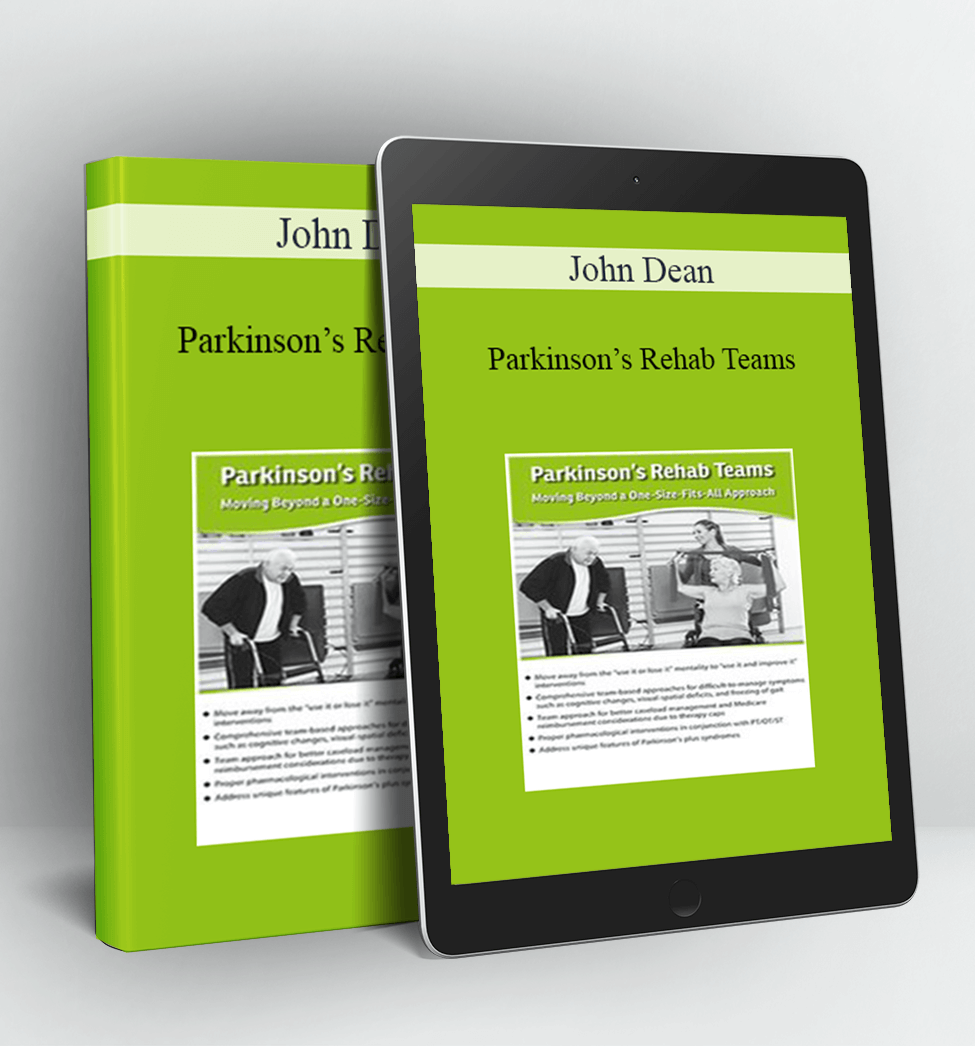
Dual Task Training for Neurological Disorders – Josefa Domingos, John Dean
- Faculty:
- Josefa Domingos | John Dean
- Duration:
- 6 Hours 32 Minutes
- Format:
- Audio and Video
- Copyright:
- Dec 10, 2019
Description
There’s no greater triumph than seeing your patients regain their functional independence, especially when you’ve played a pivotal role in their progress.
But when you’re working with patients who are older or affected by movement/neurological disorders, neuromotor deficits often impede progress, interfering with functional multitasks, such as walking while talking, that combine cognition, communication, and motor function.
This can drag therapy to a crawl, limit your clinical effectiveness, and cause a variety of setbacks, including:
- Falls
- Communication deficits
- Poor executive function
- Memory/attention issues
- Task avoidance
- Difficulty performing ADLs
- Functional codependence
- Gait and balance problems
- Anxiety, frustration and depression
- Apathy and isolation
Without intervention, these patients often become resigned to living life in slow motion, limited to basic tasks and always feeling a step behind in their work, home and community. But with the latest advances in dual-task training, you can change this.
Let Physiotherapist Josefa Domingos and Speech-Language Pathologist John Dean be your guides to success as they walk you through practical applications of dual-task training for your patients.
Learn how to unmask deficits that are secretly plaguing progress, integrate dual-task interventions into both therapy and daily life, and rapidly improve performance of functional activities between therapy sessions.
Purchase now, and discover your patients’ joy and gratitude when you show them how much more they can accomplish, using the fun, engaging framework for dual-task training you’ll learn in this hands-on recording.
Handouts
| Manual – Dual-Task Training for Movement & Neurological Disorders (30.6 MB) | 103 Pages | Available after Purchase | |
| Instructions for ASHA Credit – SELF STUDY ONLY – 12/10/19 (38.5 KB) | Available after Purchase |
Outline
Hot Topics and Innovations
- Current concepts of dual-task training
- Cutting edge clinical and research applications
- Rapidly evolving tech landscape
- Apps
- Smart speakers
- Wearables
Confidently Identify the Underlying Cause of Impairment
- Learn a comprehensive framework for assessing:
- Interference of cognition in movement
- Gait problems
- Falls and balance
- Cognitive problems
- Memory
- Attention
- Executive function
- Communication deficits
- Difficulties with daily activities
- Dressing and bathing
- Cleaning and cooking
- Technology (e.g. computer, phone)
- Transfer issues
- Fatigue, anxiety and depression
- Interference of cognition in movement
- Hands-on Lab
Upgrade Your Rehab Toolbox With the Latest Dual-Task Training Methods
- Cutting-edge techniques to:
- Increase dual-task performance in daily life activities
- Boost cognition, communication, and social interaction
- Challenge, motivate and engage patients
- Enhance gait speed, rhythm, and stride length
- Prevent falls and improve balance
- Enhance carryover outside of the treatment room
- Improve posture
- Restore functional independence
- Reduce load and stress on caretakers
- Hands-on Lab
Combine Multiple Approaches for Better Outcomes
- Synergistic strategies for effectively integrating:
- Dual-task training
- Voice and communication therapies
- Cognitive activities
- ADL training
- Amplitude-based approaches
- Exercise-based interventions
- Dance
- Boxing
- Hydrogymnastics/hydrotherapy
- Pole walking
- Balance training
- Hands-on Lab
Real World Applications for Common Diagnoses and Conditions
- Parkinson’s disease
- Progressive supranuclear palsy
- Multiple system atrophy
- Corticobasal ganglionic degeneration
- Huntington’s disease
- Stroke
- Brain injury
- Dementia
- Mild cognitive changes related to:
- Medications
- Previous injuries
- “Chemo brain”
- Indications, contraindications, and limitations of research
- Hands-on Lab
Improvise Solutions Using Your New Dual-Task Training Skills
- Case study: Correctly identify the underlying causes of impairment when the patient’s deficits do not readily appear on standardized assessments
- Case study: Use dual-task training to replicate daily activities and improve carryover in the home environment
- Case study: Incorporate everyday tech into practice, using apps and online resources
- Case study: Develop a transdisciplinary treatment plan for a patient with Parkinson’s
- Case study: Overcome barriers to effective strategy implementation
Faculty
Josefa Domingos, MSc, Physio Related seminars and products: 2
Josefa Domingos, MSc. Physio, has specialized in the treatment of Parkinson’s and related disorders for the past 15 years. She maintains a full clinical practice and serves as the national healthcare coordinator for the APDPk (Portugal’s premier Parkinson’s advocacy organization). She travels internationally to speak on topics related to dual-task training and neurological rehabilitation.
In addition, she is completing a PhD at Radboud University in the Netherlands, under the supervision of Professor Dr. Bas Bloem. Her research focuses on the development of multitask community programs for Parkinson’s, highlighting the importance of physiotherapy and other expert clinical input in the design and performance of community exercise activities.
Speaker Disclosures:
Financial: Josefa Domingos is a researcher with the University of Lisbon, Portugal. She has an employment relationship with the Portuguese Parkinson disease Patient Association (APDPk). Ms. Domingos receives a speaking honorarium from PESI, Inc.
Non-financial: Josefa Domingos is a member of the Portuguese movement disorder Society; and the Association of Physiotherapy in Parkinson disease Europe (APPDE).

John Dean, MA, CCC-SLP Related seminars and products: 4
John Dean, MA, CCC-SLP, has been specializing in the treatment of Parkinson’s and related disorders since 2007. In addition to clinical work, he has been involved in an array of Parkinson’s related projects ranging from the development of interdisciplinary Parkinson’s rehab networks for a large healthcare company, founding startups that build technologies for people living with Parkinson’s and even a stint as a member of the senior leadership at the Davis Phinney Foundation.
He resides in Lisbon, collaborating with Josefa Domingos to develop exercise activities that combine movement, voice, and cognition, as well as launching a startup that creates technologies to help scale up dual-task training for patients around the world.
Speaker Disclosures:
Financial: John Dean maintains a private practice. He is director at Davis Phinney Foundation. Mr. Dean receives a speaking honorarium from PESI, Inc.
Non-financial: John Dean is a member of the American Speech-Language-Hearing Association; and the International Parkinson and Movement Disorder Society (MDS).
Access Download Dual Task Training for Neurological Disorders – Josefa Domingos, John Dean right now!
Delivery Method:
After your purchase, you’ll get access to the downloads page. Here, you can download all the files associated with your order.
Downloads are available once your payment is confirmed, we’ll also send you a download notification email separate from any transaction notification emails you receive from Coursedownloads.







